中考英语语法讲解资料及练习(共18讲)
初中英语中考语法知识介词分类讲解(共18类)

中考英语介词分类讲解一、表示方位in:在某块更大地域的内部on:两块地接壤, 挨着to:两块地不接壤, 中间隔着【例】上海位于中国的东部.Shanghai is in the east of China.(上海是中国境内的一座城市, 处于中国内部)广东在广西的东南边.Guangdong is on the southeast of Guangxi.(广东与广西挨着, 两块地域相邻)台湾在福建省的东南面.Taiwan is to the southeast of Fujian.(台湾与福建隔海相望, 中间并不接壤, 隔得较远)east东south南west西north北①以上4个方位词既是名词(n.),又是副词(adv.)②两两组合, 就可以组成:东南southeast、东北northeast、西南southwest、西北southnorth另4个方向.【例】向西走用名词:go to the west(west属于特指, 前面必须加定冠词the)所有特指的名词前面都要加the, 比如太阳☀️只有一个, 使用时-the Sun, 同理月亮 -theMoongo是不及物动词(vi),后面跟名词必须要加介词to(不清楚及物动词/不及物动词的小伙伴, 请跳转 :【笔记】英语语法入门到精通(17)| 动词之:及物动词&不及物动词)用副词:go west(这里副词west修饰动词go)【例】向西走10米.go west/ go to the west ___ 10 meters.根据之前的结构判断原则, 10米属于名词, 前面的结构是完整的, 只不过省略了主语.go west是谓语+adv.,这里可以看成是主谓+adv., 结构完整.go to the west中, go是谓语, 介词to和名词the west共同构成介词短语, 整体也可看成主谓+介词短语, 结构完整.剩下的10meters是名词, 而完整的句子结构后面只能是adv./介词短语, 因此空行里一定是介词.答案:go west/ go to the west for 10 meters.二、表示上下↑在....上:over、above、on↓在....下:beneath、under、below①正上-正下:over-underover还有覆盖在某物体上面的意思, 也属于接触面, 但注意和on的区别, on只表示在物体表面, 没有覆盖的意思.②非正上-非正下:above-below不强调正上方/正下方时, 只要是上/下方都可以用.③表面上-表面下:on-beneath【例】你头顶正上方有一幅画.There is a painting over your head.树下面有一只大象 .There is an elephant under the tree.树上有很多苹果.There are many apples on the tree.(苹果是长在树上 的, 属于接触表面)地下有很多文物.There are a lot of antiques beneath the ground.(也可以用underground一个词表示“地下”)飞机 在云层上飞行.The plane flew above the clouds.气球在房子 上方10米处.A balloon is 10 meters above the house.(可以加具体数量词精确描述)请把你的名字写在下面.Please write your name below.三、表示前后前:in (the)front of/before后:in/at(the)back of/behind【例】那辆车在我的后面.The car is in back of me.The car is at back of me.The car is behind me.(更常用这句)我们在这座雕像前拍照吧.Let's take a photo in front of/before the statue.他坐在教室里的前面.He sits in the front of the classroom.他坐在车里的后面.He sits in the back of the car.He sits at the back of the car.四、表示附近/周围周围:around附近:near旁边:by/beside/next to【例】我手边有一支笔.There is a pen next to/beside my hand.电话在窗户旁边.The telephone is by the window.书在柜子边.The book is beside the cabinet.小狗绕着我跑.The dog ran around me.老师住在我家附近.My teacher lives near my home.五、表示中间两者之间:between在许多东西中间(3个及以上):among在许多东西的正中间(3个及以上):in the middle of【例】他坐在我和Tom的中间.He sits between me and Tom.他们在人群中行走.They walked among the crowds.他在那群人中很优秀.He is outstanding among those people.他正站在人群的正中央.He is standing in the middle of the crowd.六、表示穿越/穿过横穿:across(随随便便地穿过去)从物体内部穿过:through(水从水管流过)从物体上方穿过:over(跨栏杆)从物体旁边穿过:pass/by【例】这条小路穿过一片树林.The path goes through a wood.(小路是从树林里穿过)透过这扇窗, 你能看到一座教堂.Through the window, you can see a church.(through还可以表示目光穿过)我能隔墙听到他们交谈.I can hear their talk through the wall.(through还可以表示透过...听到声音)你穿过这道大门, 就看到左面的房子了.Go through this gate, and you'll see the house on your left.(人走过大门, 也是内部穿过)( 注意:这句话由2个简单句组成,中间逗号隔开, 并用and连接)他独自一人穿越了沙漠.He went across the desert alone.(alone这里做副词)飞机飞过了一座城市.The plane flew(fly过去式) over a city.他跳过了篱笆.He jumped over the fence.我经过了你的家.I passed your home.七、instead / instead of表示代替/而是instead-副词(adv.)instead of-介词【例】他没买手机, 而是买了电脑.① He didn't buy a phone instead of buying a laptop.(1句话)instead of是介词, 后面原本要加名词, 但buy是动词, 放在介词后面要变成ing形式(即动词+ing做为名词成分, 属于非谓语动词的一种, 后面会细讲, 记得关注哦~)句子结构分析:He didn't buy a phone.是一套完整的主谓宾,后面可以直接加介词短语/副词, instead of 是介词, 后面要加名词, 把动词buy变ing形式, 变成名词.② He didn't buy a phone.He bought a laptop instead.(2个简单句)同理, 前后2句都是完整的主谓宾,instead是副词, 原句意是买电脑替代了原本要买的手机, 所以instead放在第2句里.洗淋浴吧, 别用浴缸了.Take a shower instead of a bath.Don't use the bath.Take a shower instead.八、according to / based onaccording to根据based on以...为基础2个都是介词短语, 在句子里前后都能放.【例】据迈克说, 这是一部很棒的电影.According to Mike, it's a great movie.(放句首要用逗号隔开)根据我的经验, 明天会下雪.It will snow tomorrow according to my experience.(不放句首时不用逗号隔开)本书是根据个人经历写成的.The book is based on personal experience.九、besides / except /except for /apart from表示除了...注意区别:besides如果去掉s,就是beside在...旁边besides-表示除了, 还...., 包括“除了”的那部分, 比如:除了喜欢吃香蕉 , 还喜欢吃苹果.两者仍然都属于“喜欢吃”的范围内.except-仅表示除了...之外, 排除意味更明显.except for-用法同except, 但更强调美中不足的那部分.apart from-besides和except的用法都可以用.【例】除了周末我们每天都工作.We work every day except/apart from weekend.(把周末排除在外)除足球外你还喜欢哪些运动?What other sports do you like besides football?(除了喜欢...还喜欢....)除了英语, 我还喜欢数学.I like math besides/apart from English.你英语很好, 除了一些语法错误.Your English is good except for some grammar mistakes.(美中不足)十、ahead of表示在...前面①不同于03部分的方位介词, ahead of的“前面”更宽泛:方位/时间(提前)/能力(优秀)/名次(领先)...② ahead of前面可以加数量词修饰.【例】有两只猫在我们前面.Two cats are ahead of us.(表示方位,可与 03部分的方位词替换)我在最后期限之前完成了作业.I finished homework ahead of the deadline.我们提前15分钟完成了测验.We finished test 15 minutes(数量/时间) ahead of time.她前程远大.She has a great future ahead of her.(a great表示数量多,程度深)她总是遥遥领先班上的同学.She was always(adv.做状语) ahead of her classmates.十一、as for 表示至于...【例】至于作业, 我明天会完成.As for my homework, I will finish it tomorrow.至于这封信, 我交给他了.As for this letter, I gave it to him.至于其他人, 回家吧.As for the others, go home.十二、of/about/on表示关于...of-比较浅显地提及, 聊到, 顺带提一嘴的感觉about-比of稍深入一点, 日常使用on-比较正式介绍时使用, 偏专业【例】昨天晚上他没有提起他妈妈.He didn't talk about his mother last night.他们谈到即将到来的圣诞节.They talk of the coming Christmas.我没有想(考虑)到成本.I don't think of the cost.我得思考一下这件事.I have to think about this thing.这是一本关于历史的书.This is a book on history.十三、like 表示像...like有2种词性:①表示喜欢时, like是动词【例】我喜欢香蕉和苹果.I(主) like(谓) banana and apple(宾).②表示像...时, like是介词,后面+n./doing(动词的名词形式)/从句.【例】我不喜欢像Tom这样的人.I don't like people like Tom.(第一个like是动词, 第二个是介词)她好像我妈妈.She is like my mother.如果“好像”前面没有主语, 用It's like(that)...., that可加可不加.It's not like...(不像.../跟...不一样)【例】好像她说的是真的.It's like (that) what she said is true.好像是他拿走了我的书.It's like (that) he took my book.你并不爱她.It's not like you love her.和上次不一样.It's not like last time.跟我3年前看到的不一样.It's not like what I saw 3 years ago.十四、as 表示当作...as这里作为介词,表示当作..., 中文意思里和like表示像...相近, 但as的所谓“像”的程度比like更深, 甚至可以理解为"就是...(通常是职业或身份)", 而like仅仅是“相像”.【例】她把我当做朋友一样.She treats me as a friend.(像对待朋友一样对待“我”)你可以把那个玻璃杯当作花瓶用.You can use that glass as a vase.他工作起来像个警察.He works as a police.(几乎就是警察)He works like a police.(只是像, 但并不等于就是警察)十五、in exchange/return/reward for...表示作为....的交换/回报/奖励① in exchange for-作为...的交换【例】我用我的照相机交换他的DVD.I gave him my camera in exchange for his DVD.② in return for-作为...的报答【例】为了报答他的帮助,我给他送了份礼物.I gave him a present in return for his help.③ in reward for-作为...的奖励【例】他因勇敢获得了钱.He received money in reward for his bravery.【英语语法笔记(30)】介词(三):表示“原因”的介词大汇总十六、表示原因-Because of(because是连词, 加上of变成了介词)-Due to通常放在句首, 引导一个简单句子或复合句中的从句.它们的语气比较中性, 不会带有太多情感色彩.【例】因为下雨, 他迟到了.Because of the rain, he was late.由于天气炎热, 他决定待在家里.Due to the hot weather, he decided to stay home.-As a result of 作为...的结果表示结果或影响, 通常放在句子的开头或结尾, 引导一个简单句子或复合句中的从句.它的语气比较正式, 有时带有一定的客观性.【例】她因受伤而死亡.She died as a result of her injuries.由于雾太大, 所有航班都延误了.As a result of the heavy fog, all flights have been delayed.-On account of-Owing to表示"由于", 语气比较正式、书面化, 常见于正式文体中.【例】由于天气不好,飞机延迟了.The flight was late on account of the bad weather.The flight was late owing to the bad weather.注意:以上 这些表示原因的词组都属于介词, 后面要加名词/代词/动名词(后2个都相当于名词)十七、thanks to...多亏了...thanks to也有表示原因的意味.【例】多亏了你的帮助, 我才能按时完成项目.Thanks to your help, I was able to finish the project on time.多亏了你, 我们才能出国.Thanks to you, we can go abroad.多亏了你, 现在大家都知道了!Everyone knows about it now, thanks to you!(这句话更贴近咱中文“正话反说”, 或有点儿讽刺意味的那种感觉)十八、for/at/from/of/with/by/out of/through表示原因-for:表示某事发生的原因, 常用于解释某种行为或结果.【例】我对我的错误感到很抱歉.I'm sorry for my mistake.他为迟到道歉.He apologized for being late.-at:表示某个事件A/状态是导致某事B发生的原因.【例】他粗鲁的行为让她生气.She was angry at his rude behavior.Tom的妈妈对Tom的成绩感到很惊讶.Tom's mother was surprised at Tom‘s grades.-from:强调事件发生是源于外部原因-of:强调事件发生是源于内部原因【例】他死于车祸.He died from a car accident.他死于饥饿.He died of starvation.(这里原句可以理解为:他死了, 是因为某个原因, 前半句是个完整句子, 后面加上介词短语表示“原因”)-with:因情绪导致某事或某种状态发生.【例】他激动地大叫.He yelled with excitement.他气得发抖.He shivered with anger.(anger是angry(a.)的名词)-by:通常用by mistake(搞错了)/by chance(偶然)/by accident(意外)【例】他错误地删除了文件.His deleted the file by mistake.警方误抓了他.He has been arrested by mistake.我碰巧在机场遇见她.I met her by chance at the airport.我看见这封信纯属偶然.I saw the letter purely by chance.她碰巧发现了这个问题.She discovered the problem by accident.这不是偶然.It doesn't happen by accident.-out of:表示出于...原因【例】她接受这份工作是出于必要.She took the job out of necessity.他只是出于兴趣做的这份工作.He did this job just out of interest.-through:表示通过...获得结果【例】公司通过创新和辛勤工作取得了成功.The company achieved success through innovation and hard work. 病人通过物理治疗恢复了健康.The patient recovered through a physical therapy.。
中考英语语法讲解资料及练习(共18讲)
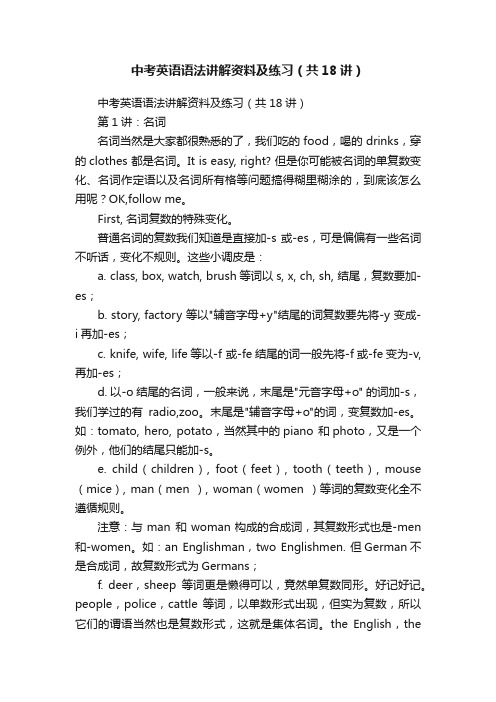
中考英语语法讲解资料及练习(共18讲)中考英语语法讲解资料及练习(共18讲)第1讲:名词名词当然是大家都很熟悉的了,我们吃的food,喝的drinks,穿的clothes 都是名词。
It is easy, right? 但是你可能被名词的单复数变化、名词作定语以及名词所有格等问题搞得糊里糊涂的,到底该怎么用呢?OK,follow me。
First, 名词复数的特殊变化。
普通名词的复数我们知道是直接加-s或-es,可是偏偏有一些名词不听话,变化不规则。
这些小调皮是:a. class, box, watch, brush等词以s, x, ch, sh, 结尾,复数要加-es;b. story, factory 等以"辅音字母+y"结尾的词复数要先将-y 变成-i再加-es;c. knife, wife, life等以-f 或-fe结尾的词一般先将-f或-fe变为-v, 再加-es;d. 以-o结尾的名词,一般来说,末尾是"元音字母+o" 的词加-s,我们学过的有radio,zoo。
末尾是"辅音字母+o"的词,变复数加-es。
如:tomato, hero, potato,当然其中的piano 和photo,又是一个例外,他们的结尾只能加-s。
e. child(children), foot(feet), tooth(teeth), mouse (mice), man(men ), woman(women )等词的复数变化全不遵循规则。
注意:与man 和woman构成的合成词,其复数形式也是-men 和-women。
如:an Englishman,two Englishmen. 但German不是合成词,故复数形式为Germans;f. deer,sheep等词更是懒得可以,竟然单复数同形。
好记好记。
people,police,cattle 等词,以单数形式出现,但实为复数,所以它们的谓语当然也是复数形式,这就是集体名词。
英语语法讲解及练习大全(附答案)

Contents第一部分语法讲解第一讲词类、句子成分、构词法 (3)第二讲名词 (4)第三讲代词 (6)第四讲数词 (9)第五讲冠词 (10)第六讲形容词和副词 (12)第七讲介词 (19)第八讲动词(一)动词概述 (21)第九讲动词(二)动词时态和语态 (25)第十讲动词(三)非谓语动词及动词辨析 (29)第十一讲连词 (35)第十二讲简单句 (36)第十三讲句子成分 (39)第十四讲简单句句式 (42)第十五讲并列句和主从复合句 (43)第二部分巩固与提高测评测评一名词 (47)测评二代词 (48)测评三数词 (51)测评四冠词 (52)测评五形容词和副词 (54)测评六介词 (58)测评七动词 (60)测评八连词 (69)测评九句子 (70)测评十交际用语 (75)第三部分语法网络图第一讲:词类、句子成分和构词法:2、代词(pron.):主要用来代替名词。
如:who, she, you, it .3、形容词(adj..):表示人或事物的性质或特征。
如:good, right, white, orange .4、数词(num.):表示数目或事物的顺序。
如:one, two, three, first, second, third, fourth.5、动词(v.):表示动作或状态。
如:am, is,are,have,see .6、副词(adv.):修饰动词、形容词或其他副词,说明时间、地点、程度等。
如:now, very, here, often, quietly, slowly.7、冠词(art..):用在名词前,帮助说明名词。
如:a, an, the.8、介词(prep.):表示它后面的名词或代词与其他句子成分的关系。
如in, on, from, above, behind.9、连词(conj.):用来连接词、短语或句子。
如and, but, before .10、感叹词(interj..)表示喜、怒、哀、乐等感情。
(26套全)2019年中考英语语法专项讲义附练习(史上最全的中考语法讲义)

(26套全)2019年中考英语语法专项讲义附练习(史上最全的中考语法讲义)被动语态被动语态知识精讲一、被动语态语态是动词的一种形式,表示主语和谓语动词之间的具体关系,分为主动语态和被动语态两种。
主动语态表示主语是谓语动词所表示的动作的执行者。
被动语态表示主语是谓语动词所表示的动作的承受者。
被动语态是动词的一种特殊形式,一般来说,只有需要动作对象的及物动词才有被动语态。
汉语往往用“被、受、给”等被动词来表示被动意义。
其结构是由“助动词be+及物动词的过去分词done”构成的。
be本身无词义,但有时态、人称和数的变化,其变化与时态中的变化一致。
各种时态的被动语态结构表(以动词do为例):时态被动语态例句The classroom is cleaned by us.一般现在时am/is/are+ done教室被我们打扫。
The kite was made by him yesterday.一般过去时was/were+ done昨天,风筝被他制作。
Flowers are being watered by her.现在进行时am/is/are+ being+ done花儿现在正在被她浇。
The work has been finished by Jim.现在完成时have/has +been+ done工作已经被做完。
二、被动语态的用法1. 不知道或没有必要指出谁是动作的执行者时。
例:The bridge was built last year. 这座桥是去年建造的。
He was elected chairman. 他被选为主席。
2. 当更加强调动作的承受者时。
此时动作的执行者由by引导置于谓语动词之后,不需要时可以省略。
例:The room hasn’t been cleaned yet. 房间还没有打扫。
The tiger was killed by him. 老虎被他杀死了。
3. 当动作的执行者不是人时,多用被动语态。
中考英语复习语法专题- 动词第三人称单数讲解及练习
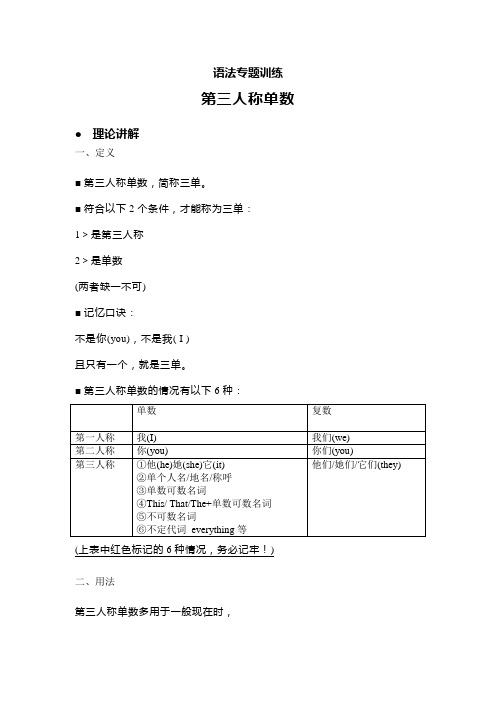
语法专题训练第三人称单数理论讲解一、定义(上表中红色标记的6种情况,务必记牢!) 二、用法第三人称单数多用于一般现在时,当主语符合第三人称单数时,动词也要变成第三人称单数形式。
即:主语三单,动词三单。
如:They often play football on Sundays.(主语They不符合三单,动词用原形)She often plays football on Sundays.(主语She符合三单,动词用三单形式)Lucy and I often go running on Sundays.(主语Lucy and I 不符合三单,动词用原形)Lucy often goes running on Sundays.(主语Lucy符合三单,动词用三单形式)三、动词三单变化■动词三单的规则变化:1>一般情况下,词尾直接加-s如:look-looks want-wants2>以s、x、o、ch、sh结尾,加-es如:go-goes watch-watches3>以辅音字母+y 结尾,变y为i , 加-es如:fly-flies study-studies■动词三单的不规则变化如:have-has实践练习一、判断下列主语是否符合三单。
符合写T,否则写F。
( )1. My parents( )3. Mr Wang( )5. Tom( )7. They( )9. This dog( )2. He( )4. Everything( )6. Those ships( )8. The meat( )10. Her aunt( )11. The elephant ( )13. Three eggs( )15. Children’s Day ( )17. Peter and his family ( )19.The ugly duckling ( )21. Mother Duck ( )23. The plant( )25. The people( )27. The sun( )29. These grapes ( )31. Her mother ( )33. The girl( )35. The second pea( )37. The weather( )39. Father Christmas ( )41. Peter’s nose( )12. Children( )14. Joe’s favorite story ( )16. Kitty and Alice( )18. The underground station ( )20. The photo of my family ( )22. Different roads( )24. Some animals( )26. Many interesting stories ( )28. A pair of shoes( )30. Your school( )32. All our books( )34. students( )36. Our house( )38. A lot of shops( )40. Mr. Green and Mr. Smith ( )42. Kitty’s little brother二、写出下列动词的三单形式。
初中英语语法知识点精讲+习题+练习(精华版).doc
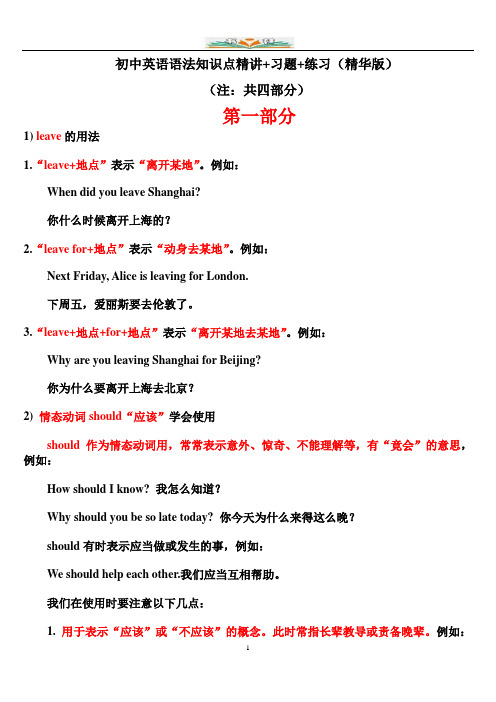
初中英语语法知识点精讲+习题+练习(精华版)(注:共四部分)第一部分1) leave的用法1.“leave+地点”表示“离开某地”。
例如:When did you leave Shanghai?你什么时候离开上海的?2.“leave for+地点”表示“动身去某地”。
例如:Next Friday, Alice is leaving for London.下周五,爱丽斯要去伦敦了。
3.“leave+地点+for+地点”表示“离开某地去某地”。
例如:Why are you leaving Shanghai for Beijing?你为什么要离开上海去北京?2) 情态动词should“应该”学会使用should作为情态动词用,常常表示意外、惊奇、不能理解等,有“竟会”的意思,例如:How should I know? 我怎么知道?Why should you be so late today? 你今天为什么来得这么晚?should有时表示应当做或发生的事,例如:We should help each other.我们应当互相帮助。
我们在使用时要注意以下几点:1. 用于表示“应该”或“不应该”的概念。
此时常指长辈教导或责备晚辈。
例如:You should be here with clean hands. 你应该把手洗干净了再来。
2. 用于提出意见劝导别人。
例如:You should go to the doctor if you feel ill. 如果你感觉不舒服,你最好去看医生。
3.用于表示可能性。
should的这一用法是考试中常常出现的考点之一。
例如:We should arrive by supper time. 我们在晚饭前就能到了。
She should be here any moment. 她随时都可能来。
3) What...? 与Which...?1. what 与which 都是疑问代词,都可以指人或事物,但是what仅用来询问职业。
中考英语系列复习资料(18)短文填空考点集汇,讲解和训练

中考英语系列复习资料(18)短文填空考点集汇,讲解和训练【考点扫描】短文填空是近两年才创设的一种新题型。
这种题型通常有四种形式:1、给出一篇难易适中的短文,中间去掉几个单词,让考生根据上下文填上所缺的单词。
2、给出一篇难易适中的短文,中间去掉几个单词,但给出这些单词的第一个字母,让考生根据短文的上下文的意思和所给的提示字母,填上所缺的单词。
3、给出一篇难易适中的短文,中间去掉几个单词,同时在一个方框内给出一些单词,让考生根据短文的内容,把这些单词填入空白处,使文章正确、通顺。
4、给出一篇难易适中的短文,中间去掉几个单词或短语,同时给出这些单词或短语的汉语意思,让考生根据短文的上下文和所给汉语的提示,填上适当的单词或短语。
某某省的短文填空题采用的基本上是第四种形式。
这种题型考查的是考生的整体阅读能力、基础语法的运用能力和书面表述能力,特别是单词和短语的拼写能力。
它是介于阅读理解和书面表达之间的一种题型。
某某省中考英语题中的短文填空题又有什麽具体特点呢?1、从文体上看,议论文和叙事文为主。
2002年某某省的短文填空题所给的短文是一篇论说文,论说的主题是:只有母亲的爱是真正的爱。
2003年的中考说明样题所给的短文是一篇叙事文。
讲述的是圣诞节的情况。
2003年的中考题中的短文填空题也是一篇叙事文。
讲述的是主题是因特网的历史。
2004年是一篇论说文。
2、从填空的内容上看,以词组和短语为主。
2002年短文填空题共有10个空,其中6个空填的是词组和短语。
2003年中考说明中短文填空题共有10个空,其中7个空填的是词组和短语。
2003年中考题中的短文填空题共有10个空,其中5个空填的是词组和短语。
2004年的短文填空题10个空中有6个是词组和短语。
也就是说短文填空题要填的词组和短语总体上保持在5-7个。
3、从考查的X围上看,以英语的一些特殊用法为主。
2002年的短文填空题考到了enough作副词,放在被修饰词之后的用法,考到了“with+名词”构成的介词短语的用法。
(完整版)初中英语中考语法知识点和习题(带答案)-代词

(完整版)初中英语中考语法知识点和习题(带答案)-代词(完整版)初中英语中考语法知识点和习题(带答案)-代词-CAL-FENGHAI-(2020YEAR-YICAI)_JINGBIAN代词①人称代词: 主格: 单数I 、you 、he 、she 、it复数 we 、you 、they宾格: 单数me 、you 、him 、her 、it 复数us 、you 、them⑵物主代词: 形容词性my 、your 、his 、her 、its 、our 、your 、their名词性 mine 、yours 、his 、hers 、its 、ours 、yours 、theirs③反身代词: myself 、yourself 、himself 、herself 、itself 、ourselves 、yourselves 、themselves1.形容词性物主代词在句中只能作定语,相当于一个形容词,名词性物主代词在句中可作表语、主语和宾语,相当于一个名词。
2.注意名词性物主代词在句中所指代的关系,是单数还是复数。
如:⑴These books aren't ours. Ours are new. (这里ours=our books)⑵This is not our room. Ours is over there. (这里ours=our room)3."of+名词性物主代词"表示所属如:a sister of his 他的一个妹妹a friend of mine 我的一个朋友4.人称代词在并列使用时的顺序为:“第二人称,第三人称,第一人称”。
如:You, she and I all enjoy the music.5.关于反身代词,同学们须掌握其固定结构:enjoyoneself=have a good time (过得很愉快)by oneself=alone (单独、独自)help oneself to… (随便吃/喝些...) learn sth. by oneself =teach oneself sth. (自学)练习题1.-Whose trousers are these -_____, I think.A.TheyB.TheirC.TheirsD.Them2. Nobody taught___English. He taught____. A.him, himselfB.his, himselfC.him, by himselfD.his, his(二)修饰可数名词many few 表否定意义 a few 表肯定意义修饰不数名词 much little 表否定意义 a little 表肯定意义 few 和 little 与 quite 或 only 连用时,常加不定冠词a.如:There are quite a few new books in the library.=用little, a little, few, a few填空: 1.I often stay at home becauseI have ______ friends here.2.Jim,don't go and get some water. There is ______ water in the glass.3.Though he learned French only ________ weeks. He can speak very well.4.Lily had _________ bread because she was hungry yesterday.(三)不定代词: something, anything, nothing.当形容词修饰这三个不定代词时,常后置。
初中英语语法讲解-15个专题汇总(习题和答案)word版
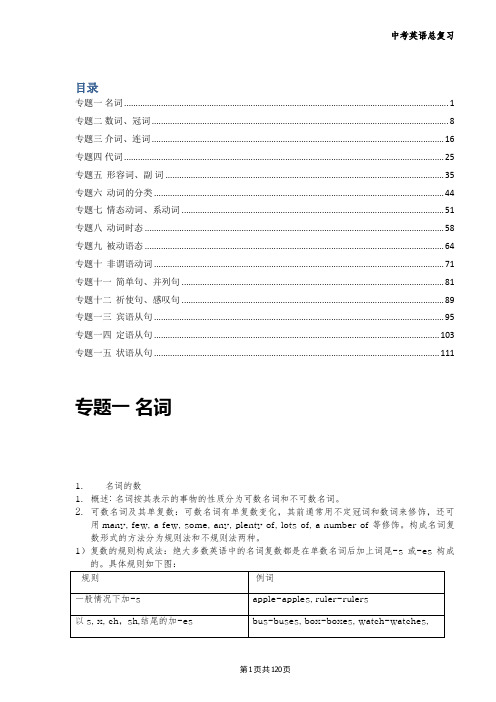
目录专题一名词 (1)专题二数词、冠词 (8)专题三介词、连词 (16)专题四代词 (25)专题五形容词、副词 (35)专题六动词的分类 (44)专题七情态动词、系动词 (51)专题八动词时态 (58)专题九被动语态 (64)专题十非谓语动词 (71)专题十一简单句、并列句 (81)专题十二祈使句、感叹句 (89)专题一三宾语从句 (95)专题一四定语从句 (103)专题一五状语从句 (111)专题一名词1.名词的数1.概述: 名词按其表示的事物的性质分为可数名词和不可数名词。
2.可数名词及其单复数:可数名词有单复数变化,其前通常用不定冠词和数词来修饰,还可用many, few, a few, some, any, plenty of, lots of, a number of 等修饰。
构成名词复数形式的方法分为规则法和不规则法两种。
1)复数的规则构成法:绝大多数英语中的名词复数都是在单数名词后加上词尾-s或-es构成的。
具体规则如下图:a.单复同形的:Chinese-Chinese, Japanese-Japanese, deer-deer, sheep-sheep, fish-fish(表示鱼的数量)b. 熟记下列词的复数变化:man-men, woman-women, policeman-policemen, foot-feet, tooth-teeth, mouse-mice, child-childrenc. 以man, woman做定语构成的复合名词,变复数时要全变:a man teacher-two men teachers; 其他情况一般只变主体名词而作定语的名词不变:a girl student-two girl students3. 不可数名词:不可数名词没有单复数。
如:water, meat, air等。
在表示数量时,通常用以下方法。
1)用some, much, a little, little, a lot of, lots of, plenty of 等表示多少。
初中英语语法精讲讲义(完整版)

(内部资料) 2018.1目录第一讲名词第二讲冠词第三讲代词第四讲数词第五讲介词第六讲形容词和副词第七讲连词第八讲情态动词第九讲非谓语动词第十讲时态第十一讲被动语态第十二讲祈使句、倒装句、反意疑问句和感叹句第十三讲宾语从句第十四讲定语从句第十五讲状语从句第十六讲主谓一致第十七讲情景交际第十八讲词义辨析附录I 重点短语概述一、概述语法是研究词形变化和句子结构的科学,研究词形变化的部分成为词法(名词的数、格,动词的时态、语态),研究句子结构的部分称为句法(句子成分、语序,句子种类)。
二、英语词类词类英语作用在句中成分例词1名词n.表示人或物的名称主、宾、表、定、同位mother, son 2形容词adj.表示人或物的特征定、表、补、状big, small 3数词num.表示数目或顺序主、宾、nine, first 4代词pron.代替名词,数词主语宾语定语he, him, his 5动词v.表示动作或状态谓come, write 6副词adv.表示动作特征或性状特征状、表very, slowly 7冠词art.用在名词前说明其意义不做成分a, an, the8介词prep.用在名代前说明它与别的词之间的关系不做成分for, from, to 9连词conj.用来连接词与词或句与句不做成分and, but, if 10感叹词interj.表示说话时的感情或口气不做成分oh, ow三、句子成分句子中有两个最重要最基本的成分,主语和谓语。
除了主语和谓语,句子有时还有其他成分,宾语、定语、状语、表语等。
主语:一般位于句首,说明所要讲述的对象或主体,表示要说的“谁”或“什么”,一般由名词、代词或名词性的词类、短语或从句充当。
We often practise speaking English after class.Your father’s car is new.Watching English films is a good way to learn English.谓语:位于主语之后,说明主语的情况(动作或状态)---“做什么”“是什么”“怎么样”。
第18讲 看图写话(讲义)-2024年中考英语一轮复习讲练测(全国通用)(原卷版)

►第18讲看图写话(讲义)目录一复习目标掌握目标及备考方向二考情分析看图写话中考考情分析三看图写话的考向1.看图写话的时态和语态、常考的句型解构、常考的简单句和复合句2.掌握简单有效的解题策略和正确的解题步骤3.提升必考题型归纳四真题感悟中考看图写话经典考题精选【复习目标】1.看图写话的时态和语态、常考的句型解构、常考的简单句和复合句2.掌握简单有效的解题策略和正确的解题步骤【考情分析】看图写话命题规律看图写话解题技巧看图写话以图画作为材料,培养学生的观赏、想象和表达能力,是丰富语言积累的好方法,也是写作的第一步。
内容主要包括写人、记事、写景、写物。
下面总结归纳该题型的解题步骤技巧:1.图文结合、审清题意。
看图写话,看图是基础,看图时应先从整体入手,初步感知图画的主要内容,即弄清时间、地点、有什么或者是什么人在干什么。
然后结合所给提示词,初步确定图画所传达的意思。
2.组织语言,构建句子。
在熟练掌握简单的五种基本句型、there be句型、祈使句、感叹句、主从复合句等基础上确定句子结构,然后根据句子结构先表达句子主干部分,再考虑在句子相应位置添加定语、状语等修饰看图写话题型是给出五幅图画,并给出1—2个单词或短语,要求学生结合所给图画和词汇提示写出一个符合图意、句式结构正确的句子。
这一题型句型结构多样,但均较为基础、涉及简单句的五种基本句型、there be句型、祈使句、感叹句、主从复合句等,并结合时态、语态进行考查。
成分。
3.明确时态、语态及词形变化。
根据图文信息判断用哪种时态和语态,同时注意单词的词形变化,如:第三人称单数、名词的单复数、人称代词的主宾格、谓语动词等。
4.图文对照、细审文字、检查修正。
写完全句后,要重新审读一遍,进行修改(语法、用词、拼写、标点等)和加工润色。
特别要注意三点:一是不要漏掉应表达的内容;二是所写内容要符合英语表达习惯,不可根据语法生造句子;三是检查所写句子是否有语法和词汇的错误。
新编英语语法教程1-18讲参考答案---上外第五版

《新编英语语法教程》1-18讲参考答案新编英语语法教程第01讲练习参考答案Ex. 1A1. A. his home workB. quickly, to play2. A. The huge black horseB. the race3. A. have thought aboutB. going into space4. A. warms up and crawlsB. out of the bag5. A. one of the most beautiful planets to look at through a telescopeB. because of the many rings that surround it6. A. 165 yearsB. to complete its path, or orbit,around the sun7. A. you and your brotherB. How many pairs of shorts8. A. the most expensive meal listed on the menuB. What9. A. an “Outdoor Code”B. their members10. A. can blowB. as fast as 180 miles (290 kilometers) an hour11. A. The spiral of heated air and moist airB. to twist and grow and spin12. A. The direction a hu rricane’s spiral movesB. counterclockwise13. A. does not shineB. At the north pole: for half of the year14. A. The cold winds that blow off of the Arctic OceanB. a very cold place15. A. might have beenB. guilty of murderEx. 1B1. SVCWithin the stricken area, not a single soul remained alive, and the city centre looked as if it had been razed by monster steam-roller.2. SVThe bomb exploded 1,000 ft. above the groun.3. SVOOn August 6, 1945, an American aircraft dropped a bomb on the Janpanese town of Hiroshima.4. SvoOThree days later, yet another bomb of the same kind gave the town of Nagasaki the same fatal blow.5. SVOCThe explosion made one and a half square miles of the city an expense of reddish rubble.6. SV AWithin the fraction of a second, the bomb changed from a metal cylinder into an immense mass of enpanding gas, millions of degrees hot.7. SVOAA tremendous blast of hot air whirled the debris of stone, cencrete, metal, and wood over the ground. Ex. 1C1. Walden Pond, once praised by Thoreau for its natural beauty, is now the site of many tourist stands.2. Almost every summer night the cooling northeast wind swept through our bedroom windows, marking air conditioning unnecessary and a light blanket welcome. / Swepping through our bedroom windows almost every summer night, the cooling northeast wind made…3. The steep surrounding slopes were capped with snow, which fed two streams plunging down to join in the valley below.4. With the river on one side and a large tree providing shade, this is a good spot for a picnic, and we can spread our blanket on the grassy knoll.5. Panting for breath after running up the stairs, Mr wood stood at his neighbour’s doo r and knocked again and again till someone opened it.6. The town folk envied horace, who had come into a small fortune with which he bought a big house and obtained a partnership in the biggest grocery in town.7. Standing in front of the mirror, Jim looked at his image, wondering at the big change that had come over him in recent years.8. The idea that his only daughter whom he had greatly wronged might never forgive him almost drove hime mad.9. The story, written in plain language, consists of three parts with an interesting plot centering round an aristocratic family living in 17th century France.10. Mud-covered and shivering, John sat hunched over a bowl of hot broth prepared by his father to drive off the chill.11. Far above the waters of a beautiful lake and over the tops of the tall pime trees growing on the steep ofa hill stand five Chinese-style pavilions.12. Farther down the street, the old man stopped and leaned against a lamp-post, listening to a cheerful song coming out of a restaurant on the oppsite side of the street.13. Sarah sank in the nearest chair, completely exhausted, her limbs stiff with cold, her mind a piece of blank.14. Throughout the day Mrs Rymer behaved very properly, her pleasant, refined face wearing a grave look, her elegant figure wrapped in deep mourning while occasionally she uttered a sigh or a sob.15. Tony thought it necessary to break the news to his family, that Mr Jacob, his former employer, had promised him a half-day job at 20 pounds a week. 16. The thought that he might have wronged his friend who had rendered him good services on many occasions troubled his mind, already overburdened with worries and cares.17. The men of the disbanded royal bodyguard, suddenly turned loose onto the street of a capital seething with unrest, unemployed and perhaps disgruntled at their abrupt dismissal, were a potentially dangerous element.18. For many years London has been a business centre with hotel accommadation for visiting businessmen toghter with well-to-do travellers but completely inadequate for the swarms of shour-stay tourists landing at Heathrow or disembarking at Dover.19. Nearing the top, he climbed recklessly faser and faster, his eyes already glowing with triumph, but suddenly he slipped and fell, tumbling to the ground and lying motionless there, a crumpled pile of arms and legs.20. Bertrand Russell was one of the very few persons who have received both the Order of Merit, which was conferred on him by the British government in 1949, and the Nobel Prize for literature, conferred in Norway in 1950.新编英语语法教程第02讲练习参考答案Ex. 2A1. come2. are3. has / have4. are5. are6. are7. was / were8. is9. costs 10. were 11. are 12. are 13. was 14. are 15. lie 16. were 17. are 18. is 19. is 20. was 21. Has 22. were 23. is 24. is 25. are 26. is 27. are 28. cover, are 29. is / are 30. was/wereEx. 2B1. were2. have3. is, is4. was5. were6. is7. is8. are9. is 10. are, are11. have 12. are, their, their 13. was, It, was 14, It / They, is / are 15. are, their, they, disapprove 16. were, they 17. was 18. are 19. were 20. were新编英语语法教程第03讲练习参考答案Ex. 3A1. is2. was3. is4. has5. were6. means7. is8. is9. is 10. is 11. were 12. sells 13. is 14. are 15. are 16. are 17. is 18. is 19. was 20.provides 21. are 22. was 23. stops 24. is 25. is 26. does 27. produces 28. is 29. is 30. was Ex. 3B1. ’s2. are3. is4. are5. is6. was7. is8. were9. is 10. ’s 11. is 12. is, is, is 13. are 14. is 15. have 16. is 17. are 18. looks 19. are 20. are 21. understand 22. has 23. was 24. have 25. was 26. was 27. are 28. is 29. is 30. was 31. is 32. is / are 33. leaves 34. is / are 35. are 36. are 37. is 38. comes 39. is 40. live 41. are 42. points / point 43. are 44. is 45. are 46. was 47. is / are 48. is 49. has 50. wasEx. 3C1. is / are2. is / are3. is4. is / are5. is / are6. remain7. is8. are9. has / have 10.care / cares 11. is 12. plays 13. is 14. am 15. are / is 16. was 17. is, has 18. was 19. come 20. is新编英语语法教程第04讲练习参考答案Ex. 4A1. description2. arrangement3. attendance4. peculiarity5. expectation6. argument7. dependence 8. originality 9. exaggeration10. measurement 11. purity 12. persistence 13. extension 14. statement 15. generosity 16. entrance 17. loneliness18. forgetfulness 19. happiness 20. seriousness Ex. 4B1. strange sounds2. foods are3. chief, tribes, their, salmon (s)4. The runners-up were given pound notes / The runners-up were each given a pound note.5. bodies, their heroes6. mice, tooth-marks7. Crises, occur, families8. / 9. / 10. these businesses 11. / 12. fruits are13. / 14. these articles are well written 15. / 16. several personal kindnesses17. / 18. sufferings 19. professors 20. children are playing, sandsEx. 4C1. experience2. waters3. for advice4. an important piece of information5. for it is fun6. were not numerous7. Poultry8. directors are9. militia 10. geniuses 11. merchandise has 12. sympathies 13. experiences 14. were times, rivalry 15. clippings, were 16. lookers-on 17. foliage is 18. photos 19. 12-pages 20. Luggage isEx. 4D1. blade2. piece3. choir4. flash5. lump6. gang7. grain8. head9. staff 10. collection 11. fleet 12. cluster 13. bundle 14. bunch 15. team 16. piece 17. ear 18. bar 19. herd 20. pack 21. flock 22. crowd / swarm 23. troupe 24. bench 25. grove 26. collection 27. suite 28. squadron 29. band 30. libraryEx. 4E1-5 BCADC 6-10 CBDAB 11-15 ADBBC 16-20 BDCAB新编英语语法教程第05讲练习参考答案Ex. 5A1. my father has a car2. the bull has horns3. the prisoner escaped4. her parents consented5. somebody released the prisoner6. somebody assassinated the President7. a letter from the general / the general sent a letter8. the crowd felt sympathy9. a college for women10. a summer day, a day in the summer11. the earth has a (rough) surface12. the absence lasted ten days13. a doctoral degree, a doctorate14. the bird made the nest15. the committee made a report16. a story told by the girl / the girl told a story17. the volcano erupted18. the victim had courage / the victim was courageous19. somebody punished the boy20. the critics recevied the play in a hostile manner Ex. 5B1. The comedian performed, and he was well received by a huge audience.这位喜剧演员的演出很受广大观众的欢迎。
中考英语全程知识点总结及练习(含答案)

初一年级(上)【知识梳理】I. 重点短语1. Sit down2. on duty3. in English4. have a seat5. at home6. look like7. look at8. have a look9. come on10. at work11. at school12. put on13. look after14. get up15. go shoppingII. 重要句型1. help sb. do sth.2. What about …?3. Let ' s do sth.4. It ' s time to do sth.5. It ' s time for …6. What ' s …? It is …/ It ' s …7. Where is …? It ' s ….8. How old are you? I ' m・・.9. What class are you in? I ' m in ….10. Welcome to ….11. What ' s …plus …? It ' s ….12. I think …13. Who ' s this? This is ….14. What can you see?I can see ….15. There is (are) ….16. What colour is it (are they)? It ' s (They ' re)17. Whose …is this? It ' s ….18. What time is it? It ' s ….III. 交际用语1. Good morning, Miss/Mr ….2. Hello! Hi!3. Nice to meet you. Nice to meet you, too.4. How are you? I ' m fine, thank you/thanks. And you?5. See you. See you later.6. Thank you! You ' re welcome.7. Goodbye! Bye!8. What ' s your name? My name is ….9. Here you are. This way, please.10. Who ' s on duty today?11. Let ' s do.12. Let me see.IV. 重要语法1. 动词be的用法;2. 人称代词和物主代词的用法;3. 名词的单复数和所有格的用法;4. 冠词的基本用法;5. There be 句型的用法。
初中英语语法讲解与练习
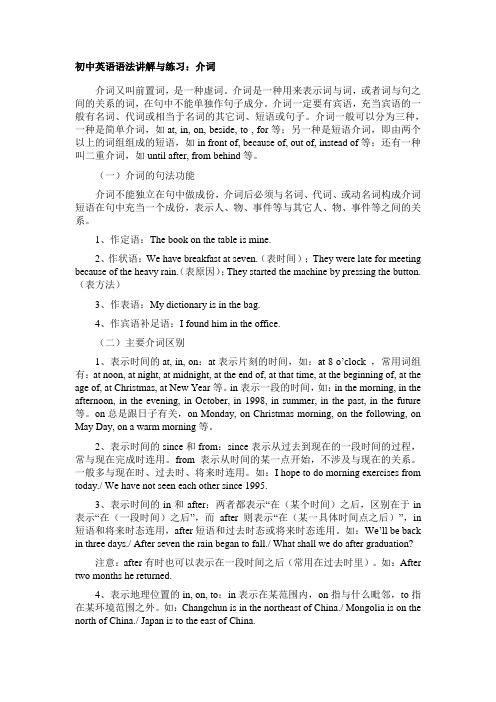
初中英语语法讲解与练习:介词介词又叫前置词,是一种虚词。
介词是一种用来表示词与词,或者词与句之间的关系的词,在句中不能单独作句子成分。
介词一定要有宾语,充当宾语的一般有名词、代词或相当于名词的其它词、短语或句子。
介词一般可以分为三种,一种是简单介词,如at, in, on, beside, to , for等;另一种是短语介词,即由两个以上的词组组成的短语,如in front of, because of, out of, instead of等;还有一种叫二重介词,如until after, from behind等。
(一)介词的句法功能介词不能独立在句中做成份,介词后必须与名词、代词、或动名词构成介词短语在句中充当一个成份,表示人、物、事件等与其它人、物、事件等之间的关系。
1、作定语:The book on the table is mine.2、作状语:We have breakfast at seven.(表时间);They were late for meeting because of the heavy rain.(表原因);They started the machine by pressing the button.(表方法)3、作表语:My dictionary is in the bag.4、作宾语补足语:I found him in the office.(二)主要介词区别1、表示时间的at, in, on:at表示片刻的时间,如:at 8 o’clock ,常用词组有:at noon, at night, at midnight, at the end of, at that time, at the beginning of, at the age of, at Christmas, at New Year等。
in表示一段的时间,如:in the morning, in the afternoon, in the evening, in October, in 1998, in summer, in the past, in the future 等。
英语中考考点精讲精练(附答案)

第一部分名词一. 可数名词与不可数名词(1) 可数名词有单复两种形式,不可数名词只有单数。
pen—pens; bread(2) 可数名词用不定冠词或基数词修饰;不可数名词则用“不定冠词/数词+单位词+ of”修饰。
an apple; two pictures; a piece of bread; four glasses of water(3) 可数名词复数前用many, few, a few, several修饰; 不可数名词前用much, little, a little 修饰. some和any既可修饰可数名词又可修饰不可数名词。
many ideas; much bread; some books; some juice☆边讲边练——1. You can get much ____________ about the World Expo on the Internet.A mapB ticketC information2. The doctor told me to eat more ______________because it's good for my health.A orangeB vegetablesC fish二. 名词变复数(1)规则变化:A.一般情况词尾加s: map—maps; boy—boysB.以s, x, ch, sh结尾加es: box--boxes; watch—watchesC.以f/fe结尾变f/fe为v,再加es: leaf—leaves; knife—knives直接加s: chief(首领)—chiefs; gulf(海湾)—gulfsD.以辅音字母加y结尾,变y为i再加es: story—storiesE.以辅音字母加o结尾有的加es: potato—potatoes有的加s: photo—photos&巧记: 黑人(negro)和英雄(hero)爱吃土豆(potato)和西红柿(tomato),有意思(es)。
初中英语语法精讲

初中英语语法精讲第一章名词和代词一、名词1.普通名词(1)可数名词个体名词:指单个人或事物的名词如book,doctor集体名词:指一群人或一些事物总称的名词如people,family,team可数名词复数的规则变化①大多数名词在词尾加-s 如bag—bags②以-s,-x,-sh,-ch结尾等的名词加-es 如bus—buses class—classes box—boxes③以-f或-fe结尾的名词要把f或fe改为v再加-es,-ves 如leaf—leaves life—lives half—halves④以辅音字母+y结尾的名词,变y为i再加-es,-ies 如city—cities family—families⑤以-o结尾的名词一般加-es 如potato—potatoes tomato—tomatoes⑥以-th结尾的词一般加-s 如mouth—mouths path—paths小径(2)不可数名词物质名词:指无法分为个体的物质、材料的名词如air,sand,wind抽象名词:指人或事物的品质、情感、状态、动作等抽象概念的名词如peace,anger,freedom常见的不可数名词advice 建议air空气bread 面包cloth布coffee 咖啡fire火food食物fruit水果glass 玻璃grass 草hair 头发knowledge知识light光meat肉money钱music音乐news新闻paper纸tea茶rain雨rice米饭sand 沙snow雪water水weather天气wind 风work工作2.专有名词:专门指代某一人、物、地点、机构、组织等的名词。
首字母一般要大写。
如the Yangtze River,Bob,Marry二、名词所有格1.-'s所有格-'s所有格的构成方法①一般单数名词和不以-s结尾的复数名词在词尾加-'s 如my son's watch, a women's home②词尾是-s的复数名词在词尾直接加-' 如birds' nests 鸟窝my parents' new house 我父母的新房子。
胡灿奎初中英语语法18册合辑
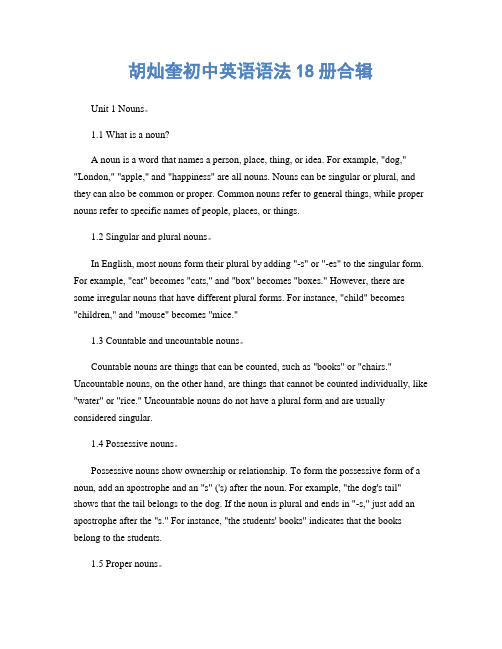
胡灿奎初中英语语法18册合辑Unit 1 Nouns。
1.1 What is a noun?A noun is a word that names a person, place, thing, or idea. For example, "dog," "London," "apple," and "happiness" are all nouns. Nouns can be singular or plural, and they can also be common or proper. Common nouns refer to general things, while proper nouns refer to specific names of people, places, or things.1.2 Singular and plural nouns。
In English, most nouns form their plural by adding "-s" or "-es" to the singular form. For example, "cat" becomes "cats," and "box" becomes "boxes." However, there are some irregular nouns that have different plural forms. For instance, "child" becomes "children," and "mouse" becomes "mice."1.3 Countable and uncountable nouns。
Unit72d语法讲练九年级英语全册(人教版)

Read and ob带se有rve情th态e c动olo词re的d w被or动ds语an态d s结ent构enxteen-y情ear态- 动词I+agbreee+. TVh-eeydaren’t serious
2. These flowers are watered every two days. (改为否定句) These flowers aren’t watered every two days.
3. That film is liked by children. (改为一般疑问句并作肯定及 否定回答) — Is that film liked by children? — Yes, it is. / No, it isn’t.
Wu Lan: Oh, no. Mr. Smith says we must not take photos.
It’s not allowed in the museum.
照相
Sandy: That’s too bad! Do you think we may be allowed
那太糟糕了! to take photos if we don’t use a flash? be allow to do
wasn't invited to was invented
was taken
Let’s enjoy a video
1 Free talk
Do your parents allow you to watch TV at home? Yes, they do.
I think you may be allowed to watch TV on weekends. But you may not be allowed to watch TV on school days.
(九年级资料)初中英语语法讲解及练习
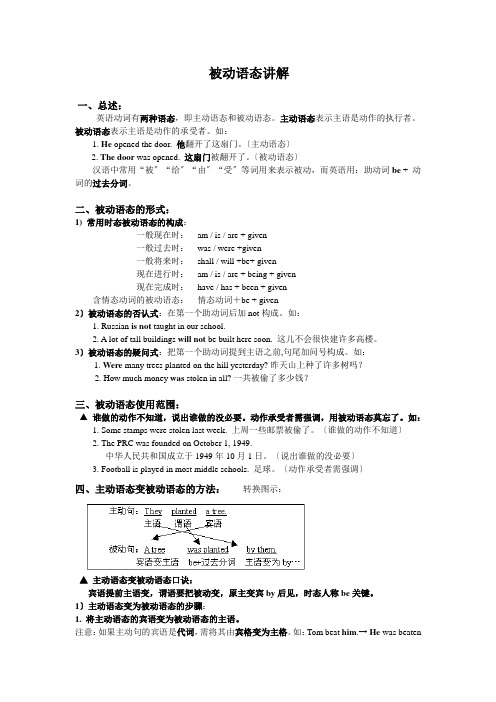
被动语态讲解一、总述:英语动词有两种语态,即主动语态和被动语态。
主动语态表示主语是动作的执行者。
被动语态表示主语是动作的承受者。
如:1. He opened the door. 他翻开了这扇门。
〔主动语态〕2. The door was opened. 这扇门被翻开了。
〔被动语态〕汉语中常用“被〞“给〞“由〞“受〞等词用来表示被动,而英语用:助动词be + 动词的过去分词。
二、被动语态的形式:1) 常用时态被动语态的构成:一般现在时:am / is / are + given一般过去时:was / were +given一般将来时:shall / will +be+ given现在进行时:am / is / are + being + given现在完成时:have / has + been + given含情态动词的被动语态:情态动词+be + given2〕被动语态的否认式:在第一个助动词后加not构成。
如:1. Russian is not taught in our school.2. A lot of tall buildings will not be built here soon. 这儿不会很快建许多高楼。
3〕被动语态的疑问式:把第一个助动词提到主语之前,句尾加问号构成。
如:1. Were many trees planted on the hill yesterday? 昨天山上种了许多树吗?2. How much money was stolen in all? 一共被偷了多少钱?三、被动语态使用范围:▲谁做的动作不知道,说出谁做的没必要。
动作承受者需强调,用被动语态莫忘了。
如:1. Some stamps were stolen last week. 上周一些邮票被偷了。
〔谁做的动作不知道〕2. The PRC was founded on October 1, 1949.中华人民共和国成立于1949年10月1日。
中考英语语法讲解及练习共18讲(13_15)

中考英语语法讲解及练习共18讲(13~15)第13讲:句子的种类(二)本讲主要讲一下感叹句,祈使句,再顺便提一下强调句.感叹句注意事项:更多感叹句往往由what和how引导。
至于what和how的区别则是再好辨别不过了。
跟我背一背下面的顺口溜,感叹句你就不再陌生了.感叹句用法很简单, How和What放句前, How与形、副词类连, What后面名词添.主语谓语不用变,省掉它们也常见. 当然,what 感叹句和how 感叹句有时可以互相转换。
当What修饰单数可数名词时,如果这一名词有形容词修饰,也可用how引导感叹句,但不定冠词a或an 需放在形容词之后。
如:What a large factory = How large a factory it is!祈使句: 祈使句所需注意的是:含有第二人称的祈使句的否定句用don't.含有第一、第三人称的祈使句的否定句用Let+not+动词原形或Don't let+第三人称代词的宾格或名词。
下面稍微提一下常考的强调句:我们学过的强调句是it引导的句子。
记住:强调句的连词只有两个,that和who。
当强调的部分是人,且为句子的主语时,才用"who",其余用"that". 句式是:It is (was) 被强调部分+that(who) + 句子其他部分。
此结构强调的成分仅限于主语,宾语和状语。
判断一个句子是否是强调句,只需看去掉It be…that是否还是一个完整的句子。
看下面例题:It is twenty years ___ Miss Feng returned to China. A. that B. when C. since D. as答案C.本题易误选为A(that). 其实本句不是强调句。
若是,去掉It be…that还应是一个完整的句子。
而本句去掉"It is...that",只剩下ten years Miss Feng returned to China.不成句。
- 1、下载文档前请自行甄别文档内容的完整性,平台不提供额外的编辑、内容补充、找答案等附加服务。
- 2、"仅部分预览"的文档,不可在线预览部分如存在完整性等问题,可反馈申请退款(可完整预览的文档不适用该条件!)。
- 3、如文档侵犯您的权益,请联系客服反馈,我们会尽快为您处理(人工客服工作时间:9:00-18:30)。
中考英语语法讲解资料及练习(共18讲)第1讲:名词名词当然是大家都很熟悉的了,我们吃的food,喝的drinks,穿的clothes 都是名词。
It is easy, right? 但是你可能被名词的单复数变化、名词作定语以及名词所有格等问题搞得糊里糊涂的,到底该怎么用呢?OK,follow me。
First, 名词复数的特殊变化。
普通名词的复数我们知道是直接加-s或-es,可是偏偏有一些名词不听话,变化不规则。
这些小调皮是:a. class, box, watch, brush等词以s, x, ch, sh, 结尾,复数要加-es;b. story, factory 等以"辅音字母+y"结尾的词复数要先将-y 变成-i再加-es;c. knife, wife, life等以-f 或-fe结尾的词一般先将-f或-fe变为-v, 再加-es;d. 以-o结尾的名词,一般来说,末尾是"元音字母+o" 的词加-s,我们学过的有radio,zoo。
末尾是"辅音字母+o"的词,变复数加-es。
如:tomato, hero, potato,当然其中的piano 和photo,又是一个例外,他们的结尾只能加-s。
e. child(children), foot(feet), tooth(teeth), mouse(mice), man(men ), woman(women )等词的复数变化全不遵循规则。
注意:与man 和woman构成的合成词,其复数形式也是-men 和-women。
如:an Englishman,two Englishmen. 但German不是合成词,故复数形式为Germans;f. deer,sheep等词更是懒得可以,竟然单复数同形。
好记好记。
people,police,cattle 等词,以单数形式出现,但实为复数,所以它们的谓语当然也是复数形式,这就是集体名词。
the English,the French,the Chinese等名词表示国民总称时,也作复数用。
注意:maths,politics,physics等学科名词,虽然以-s结尾,仍为不可数名词。
还有theUnited States(美国),the United Nations(联合国)等应视为单数。
别奇怪,名词有时也可以作定语的。
它作定语时一般用单数,但也有以下例外。
a. man, woman等作定语时,它的单复数以其所修饰的名词的单复数而定。
如:men workers,women teachers。
b. 数词+名词作定语时,这个名词一般保留单数形式,中间加连字符。
如:a ten-mile walk十里路,two-hundred trees 两百棵树。
哇!这些问题好复杂,我好想轻松一下。
那我们就轻轻松松地面对名词所有格问题。
这里面内容可谓少之又少,可也不能小视呦。
名词所有格:表示“……的”通常是在名词的后面加-s,如:Children's day,father's shoes。
但以-s结尾的名词因为已经有s 了,只需加' 就OK了。
如果两个名词并列,并且分别有's,.则表示“分别有”。
.如:John's and Mary's room(约翰和玛丽各有一间,共两间);两个名词并列,只有一个's,则表示"共有"。
如:John and Mary's room(约翰和玛丽共有一间)。
还有些无生命名词的所属要用介词of来帮助一下,如:a map of China,the end of this term。
好,名词部分我们已经学完,It's a piece of cake? 接下来到了我们趁热打铁的时间了,Are you ready?练习:1. All the _____teachers and______students are having a meeting there.A. women …girlsB. women…girlC. woman…girlsD. woman…girl2. Mr Black is a friend of _________.A. Jack's aunt'sB. Jack's auntC. Jack aunt'sD. aunt's of Jack3. This toy was made by a ____ boy.A. ten-year-oldB. ten-years-oldC. ten-year-olderD.ten-years-older4. The farmer raised ten _________.A. sheepsB. deersC. horseD. cows5. She looked at us sadly with her eyes as large as_________.A. her grandmotherB. her grandmother'sC. her grandmothers'D. that of her grandmother6. We have moved into a ________.A. two- storey houseB. house of two storeyC. two-storeys houseD. two storeys house7. The ______ was too much for the child to carry.A. box's steelB. box of a steelC. steel boxD. box of the steel8. We'll give our English teacher a card for _________.A. the Teacher's DayB. Teacher's DayC. a Teacher's DayD. Teachers' Day9. Li Ping met an old friend of _______on a train yesterday. A. he B. him C. his D. her10. _________are big and bright.A. The classroom windowB. The window of the classroomC. The windows of the classroomD. The classroom's windows实战:1. Don't worry. Your son will come back in ______hour. A. a B. an C. the D. /2. This nice blouse isn't mine. It's ______. A. you B. your C. Lucy D. yours3. What's " potato" in Chinese?-It's _____ . A. 香蕉 B. 大白菜 C. 西红柿 D. 土豆4. The ninth month of a year is _______. A. December B. November C. September D. October5. A: Must I leave now? B: No, you _______. A. needn't B. mustnt C. don't D. won't6. We have a history lesson ______Wednesday afternoon. A. on B. of C. at D. to7. Suan has made quite ______friends since she came to China. A. few B. a few C. little D. a little8. A: Have you ever ______to the West Lake? B: Yes, I ______there last winter.A. gone, wentB. been, wentC. gone , have beenD. been, have9. Do you ________English? A. tell B. say C. talk D. speak10. A: May I _______your ruler? B: OK, I'm glad to _______it to you.A. lend, borrowB. lend, lendC. borrow , lendD. borrow, borrow11. We'll go to the museum if it _______tomorrow.A. can't rainB. won't rainC. don't rainD. doesn't rian12. Do you know ________?A. where does he studyB. he studies whereC. where he studiesD. he where studies13. A: _______do you go to see your grandparents?B: Once a month A. How often B. How long C. how much D. how many14. A: Would you like another cup of orange?B: ______I'm full. A. No, thanks B. Yes, please. C. Here it is. D. I don't like.15. You must be tired. Why not ________a rest?A. to stop to haveB. stop havingC. stop to haveD. to stop having第2讲:代词我们刚刚讲完了名词,现在再来看看名词的brother—代词。
它与名词的作用其实很相似,所担当的句中成分也相差不多。
但也别小看代词呀!它还有很多的“小个性”呢!只要抓住它的几个“小脾气”,那么你就可以牢牢地掌握它了。
